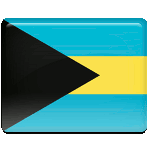Independence Day in the Bahamas Date in the current year: July 10, 2026
 The Commonwealth of The Bahamas celebrates its Independence Day on July 10. On that day in 1973, the Bahamas gained independence from the United Kingdom.
The Commonwealth of The Bahamas celebrates its Independence Day on July 10. On that day in 1973, the Bahamas gained independence from the United Kingdom.The Bahamas is an island country in the Atlantic Ocean located north of Cuba, the Dominican Republic, and Haiti. It occupies part of the Lucayan Archipelago, also known as the Bahama Archipelago, sharing it with the Turks and Caicos Islands.
The indigenous inhabitants of the Bahamas were the Lucayan people. They migrated to the previously uninhabited islands from Cuba and Hispaniola around the 11th century. The first European to visit the Bahamas was Christopher Columbus during his first voyage in 1492.
The Spanish had little interest in the Bahamas except as a source of slaves. Over the next three decades, they transported nearly all Lucayan population, which constituted approximately 40,000 people, to Hispaniola. The Spanish left the archipelago depopulated and abandoned, but retained titular claims to it.
In the mid-17th century, a group of settlers from overpopulated Bermuda tried to found a colony in the Bahamas, but the settlement wasn’t very successful due to in-fighting, conflict with the Spanish, and poor soil. In addition, it had no legal standing under English law. In the 1690s, the Bahamas became a haven for pirates, who made Nassau their base. English privateers-turned-pirates even established the so-called Republic of Pirates that existed for more than a decade from 1706 until 1718.
To put an end to the rule of pirates, Great Britain sent a fleet of seven ships to Nassau in 1718. The British re-established control over the Bahamas and declared the archipelago a crown colony. However, it remained sparsely populated until the American Revolutionary War. Following Britain’s defeat in the war, thousands of American Royalists who had been exiled from the newly independent state settled in the Bahamas.
After World War II, the world’s colonial system began to collapse, which spurred modern political development of the Bahamas. The first political parties were created in 1950s. In 1964, Britain granted the islands internal autonomy. Roland Symonette, the leader of the United Bahamian Party, became the first Premier of the Bahamas. In 1967, he was succeeded by Lynden Pindling, the colony’s first black Premier.
Pindling announced that the Bahamas would seek full independence from the United Kingdom. The House of Lords voted in favor of Bahamian independence, and the Bahamas officially became a fully independent nation on July 10, 1973. The newly independent state chose to remain a member of the Commonwealth of Nations with Elizabeth II as its queen.
Independence Day is the national holiday of the Bahamas. A week-long festival begins on July 3, leading up to the official Independence Day celebration in the capital city of Nassau. The celebration includes colorful street parades, traditional music and dance, fireworks displays, official speeches, regattas, and other festive events and activities held throughout the country.
- Category
- Public Holidays
- Country
- Bahamas
- Tags
- Independence Day in the Bahamas, holidays in the Bahamas, public holiday, national holiday